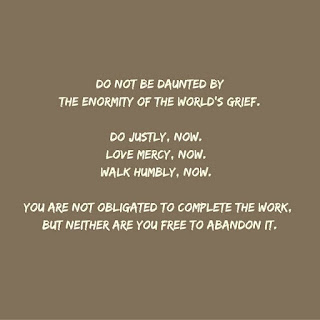 Puzzle pieces floating around in the air...looking and feeling chaotic...and then the pieces begin to come together and a picture begins emerge...
Puzzle pieces floating around in the air...looking and feeling chaotic...and then the pieces begin to come together and a picture begins emerge...That is how I feel about the work of Discipling Marketplace Ministries in the last year. Slowly a picture is coalescing, with what feels like the hand-print of God bringing it together through His people.
One major piece that has come together recently has come with the help of Dr. Walker. For years, I have taught people about having a quadruple bottom line in their workplace or business: economic, environmental, spiritual and social. But what Dr. Walker did was take that quadruple bottom line and fit it into the more common language of the mandates given by God, which we are calling the "Three Great Mandates." This is where the rubber meets the road - where the language of the Bible, the language of the Church, and the language of Business as Mission can coalesce into one.
The Spiritual bottom line can be viewed through the Great Commission. We all know about the great commission from Matthew 28: 19 Therefore go and make disciples of all nations, baptizing them in the name of the Father and of the Son and of the Holy Spirit, 20 and teaching them to obey everything I have commanded you. We are to be disciples and to make disciples. We love to ask pastors how many commands are in this text? Most say four: go, make disciples, baptize, and teach. But the real answer is only one: Make Disciples. "Go" can be explained as "as you go about your business;" and baptizing and teaching is what we do once we have made the disciples. How can we be a disciple and who can we be discipling in our place of work?
The Social bottom line can be viewed through the Great Commandment. We all know about the second great - the great commandment from Matthew 22: ‘Love the Lord your God with all your heart and with all your soul and with all your mind.' 38 This is the first and greatest commandment. 39 And the second is like it: ‘Love your neighbor as yourself.’ Who are our neighbors in the workplace? Customers, employees/employers, suppliers, competitors, colleagues, as well as the community where our place of work is located. How can I love them?
The Economic and Environmental Bottom line can be viewed through the Creation mandate, which we (at Discipling Marketplace Leaders) are calling the Great Commitment. This comes from Genesis 1: 28: God blessed them and said to them, "Be fruitful and increase in number; fill the earth and subdue it. Rule over the fish in the sea and the birds in the sky and over every living creature that moves on the ground." This is the first mandate that God gives - the work that man was given to do before the fall. Often we have been taught that being fruitful and increasing in number refers only to procreation or having children, but it also refers to the taking of the resources of creation, being creative with them, and then multiplying those creations so that more people can benefit from them. That is what most of us have been made to do. But we need to be fruitful and multiply within the limits God has given us, so that we are stewards and caretakers (and not simply users) of the earth.
The message of the "Three Greats" seems to resonate very well with pastors and church leaders and it has helped them to better understand why it is important to have a discipleship ministry to people in the workplace, helping them to understand their call to these three greats.
 It is exciting to see a picture emerge when putting a puzzle together. Sometimes you are a long way from seeing the completed picture; sometimes you work on a puzzle and never complete it (and someone else has the satisfaction of seeing it completed), sometimes all the pieces look alike and it is simply trial and error. But the satisfaction of having one piece fit after trying many...that feels good!
It is exciting to see a picture emerge when putting a puzzle together. Sometimes you are a long way from seeing the completed picture; sometimes you work on a puzzle and never complete it (and someone else has the satisfaction of seeing it completed), sometimes all the pieces look alike and it is simply trial and error. But the satisfaction of having one piece fit after trying many...that feels good!







